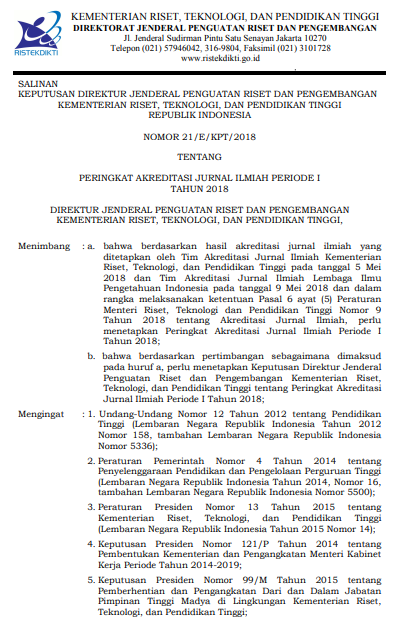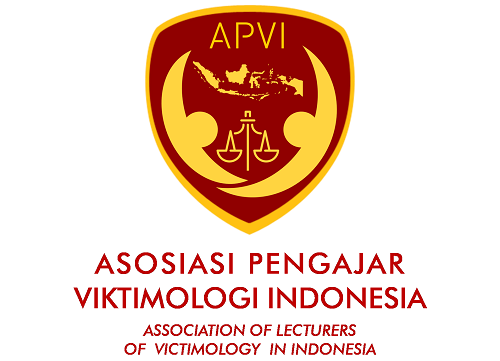Implementation of Drug (Narcotics) Convicts Development Models in The Correctional Institution
Abstract
This research aims to examine the answers to problems related to the study
of the differences in the development of the drug convicts as regulated in Law
Number 12 of 1995 concerning Corrections. Accompanied by the implementation
of guidance carried out by correctional officers for the drug (narcotics) assisted
residents, especially drug users so that these assisted residents can be re-socialized in order to realize restorative justice and the public can accept their presence again. There are several obstacles to coaching drug convicts, especially narcotics users. This study uses primary and secondary data. Direct interviews obtained primary data because during the Covid 19 pandemic; interviews were conducted online with the Cipinang Penitentiary's narcotics. Secondary data is taken from books, magazines, journals on the development of narcotics convicts. After the data has been collected, data processing and analysis are carried out and presented in the form of a report resulting from the research. From the research, it is concluded that there are differences in the coaching of the Narcotics criminal offenders concerning the intentions, the health conditions of the perpetrators and some of the coaching carried out in Correctional Institutions, especially medical, social, psychological rehabilitation, several things become obstacles in coaching, including the problem of apparatuses coordination, differences the understanding of the judge tends to punish, not rehabilitation, neglect of assessment.
Keywords: Model, Development, Convict, Narcotics.
Full Text:
PDF View
References
Abdul Razak dan Wahdi Sayuti, Remaja dan Bahaya Narkoba, Prenada, Jakarta, 2006
Ade Wahyu Rahmadani,Penyalahgunaan Narkoba, ( DKI Jakarta : Depag RI, 2003).
AF Lamintang, Hukum Penitensier Indonesia, Sinar Grafika, Jakarta, 2012
Andi Hamzah, Bunga Rampai Hukum Pidana Dan Acara Pidana, Ghalia Indonesia, Jakarta 1986.
Bambang Abimanyu, Perang Narkoba di Indonesia, Indonesia Press, Jakarta, 2019
Bambang waluyo, Viktimologi Perlindungan Korban Dan Saksi, Jakarta: Sinar Grafika, 2012.
Eddy O.S. Hiariej, Prinsip-Prinsip Hukum Pidana, Cahaya Atma Pustaka, Yogyakarata, 2016
Edy Karsono, Mengenal kecanduan Narkoba dan Minuman Keras, Yrama Widya, Bandung 2004
F Asya, Narkotika dan Psikotropika, Asa Mandiri, Jakarta, 2009.
Hari Sasangka, Narkotika dan Psikotropika Dalam Hukum Pidana,Mandar Maju, Bandung, 2003.
Hartono, Penyidikan dan Penegakan Hukum Pidana Melalui Pendekatan Hukum Progresif, Sinar Grafika, Jakarta, 2012
Mudji Waluyo, Pedoman Pelaksaanaan P4GN, Badan Narkotika Nasional, Jakarta, 2007.
Rahardi Ramelan, Cipinang Desa Tertinggal, Republika, Jakarta, 2008
Romli Atmasasmita, Tindak Pidana, Teori dan Kapita Selekta Kriminologi, PT. Eresco, Bandung, 1992.
Siswanto. S, Politik Hukum Dalam Undang-Undang Narkotika Nomor 35 tahun 2009, Jakarta : Rineka Cipta, 2012.
Subagyo Partodiharjo, Kenali Narkoba dan Musuhi Penyalahgunaannya, Esensi, Jakarta, 2010
Suhasril, Tindak Pidana Narkotika, Ghalia Indonesia, Bogor, 2005.
Topo Santoso, Hukum Pidana, Rajawali Pers, Depok, 2020
Wimanjaya K. Liotohe, Bahaya Narkotika Bagi Remaja, CV. Petra Jaya, Jakarta Pusat, 2001.
DOI: http://dx.doi.org/10.20884/1.jdh.2020.20.2.2938
Refbacks
- There are currently no refbacks.
JURNAL DINAMIKA HUKUM Indexed by :
 | Jurnal Dinamika Hukum | |
| Faculty of Law, Universitas Jenderal Soedirman | Copyright of Jurnal Dinamika Hukum | |
| Yustisia IV Building, Law Journal Center | ISSN 2407-6562 (Online) ISSN 1410-0797 (Print) | |
| Purwokerto, Central Java, Indonesia, 53122 | JDH is licensed under a Creative Commons Attribution 4.0 International License | |






